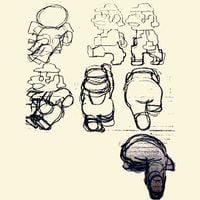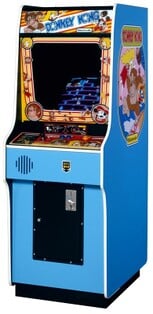Donkey Kong (game)
Template:Articleabout Template:Infobox Arcade Game Donkey Kong was an arcade game that was Nintendo's first big game in North America. It also marked the first appearance of Mario (originally known as "Jumpman",as a carpenter) and of the original Donkey Kong (Cranky Kong). A version of the game was also created later for the Nintendo Entertainment System in 1986, Nintendo's first home console.
The game sold well in the United States. It is one of four games to be inducted into the Nintendo Hall of Fame. The original arcade version had four screen levels, but the Nintendo Entertainment System version only has three, with the stage [50m] cut from this version.
Super Smash Bros. Brawl also has the game Donkey Kong as an unlockable masterpiece. Instead of starting from the beginning stage, players will start at the second stage. To unlock it, the player must play the game for ten hours. There is also an unlockable stage, 75m that is based on the third level of the game, Donkey Kong.
Story
Donkey Kong has escaped from his owner Mario. In a rage, he takes Mario's girlfriend Pauline (originally known as Lady) to the top of a construction site. Mario must climb to the top of this construction site and rescue Pauline from the Donkey Kong.
Official Story Quoted From Nintendo of America
"HELP! HELP!" cries the beautiful damsel in distress as she is dragged up a labyrinth
of structural beams by the ominous and diabolical Donkey Kong. "SNORT. SNORT." The maiden is not Princess Peach, but a woman named Pauline, who, in her pink dress screams for help from the beast that lay ahead of her." HELP! HELP!" is what somebody might hear. And yes, in fact, somebody DID hear her, none other than the brave carpenter Mario. Little Mario, as called by most. The frightening music warns him of the perils that lie ahead of him, as well as the evil Donkey Kong.
Despite the height of the structure and all of the dangers that lie ahead, little Mario tries desperately to climb the mighty fortress of steel, to save the lovely lady from the evil ape Donkey Kong. Little Mario must dodge all manner of obstacles - balls of flaming nova, beams of steel that plummet down and a barrage of exploding barrels fired at him by Donkey Kong himself. Amidst the beautiful girls' constant plea for help, your challenge is to maneuver little Mario up the steel structure, while helping him to avoid the rapid-fire succession of hazards that come his way.
As little Mario gallantly battles his way up the barriers, he is taunted and teased by Donkey Kong just as a bully, who brazenly struts back and forth, beating his chest in joyful exuberance at the prospect of having the beautiful maiden all to himself and also to the fact that he is mocking Little Mario. It is your job to get little Mario to the top. For it is there, and only there, that he can show his vengeance on the evil DK, sending him to his mortal doom. And as in all great tales, Donkey Kong is beaten, possibly seeking revenge another time, but leaving the bold and brave Little Mario and the beautiful maiden to live happily ever after."SIGH. SIGH."
Characters
- Mario (Hero, Playable)
- Pauline (Goal, Unplayable)
- Donkey Kong (Villain, Unplayable)
Enemies
Items
Levels
History
Donkey Kong was created when Shigeru Miyamoto, under the supervision of the late Gunpei Yokoi, was assigned by Nintendo to convert Radar Scope, a poorly selling arcade game in North America, into a game that would have more appeal to gamers. Shigeru Miyamoto then admitted that he did not focus on the story of the game. He also said that Jumpman (later to be renamed Mario) and the Lady were not intended to have a relationship, and he did not know where the connection idea came from, but he thought that it did not matter much. The result was a major breakthrough for Nintendo and for the video game industry. Sales of the machine were brisk, with the game becoming the best selling arcade machine of all time in its era. The gameplay itself was one of the first of its time. With the growing base of arcades to sell the game to, the game was able to gain huge distribution. A well known fact is that Donkey Kong was the first appearance of Nintendo's world famous Mario character - originally known as Jumpman in this game, but renamed Mario by Nintendo of America. Donkey Kong was Nintendo's first worldwide success.

In 1982, Universal Studios sued Nintendo, claiming that Donkey Kong infringed on Universal Studios' intellectual property rights to the film King Kong. Howard Lincoln, attorney and future president of Nintendo of America, decided to fight the case, and hired seasoned attorney John Kirby to represent Nintendo. When Kirby showed that not only was Nintendo not in violation of any copyrights, but also that Universal Studios themselves had sued RKO Pictures in 1975 to prove that the plot of King Kong was in fact in the public domain, Judge Robert W. Sweet ruled in Nintendo's favor, ordering Universal to pay Nintendo $1.8 million in legal fees. In an ironic twist, Judge Sweet also ruled that Tiger's King Kong video game, licensed by Universal, infringed on Donkey Kong. After the victory, Nintendo awarded John Kirby with a $30,000 sailboat, christened the Donkey Kong, and gave him exclusive worldwide rights to use the name for sailboats.
The Donkey Kong arcade saved Nintendo from certain bankruptcy. Due to the huge success of Donkey Kong, Nintendo of America was able to grow and release many more games in succeeding years and had the resources necessary to release the Nintendo Entertainment System in the USA.
In 1981 Shigeru Miyamoto originally was going to make a Popeye game but the liscense seemed not to work according to Nintendo Power Vol. 267 that he had to make Donkey Kong then and that's how he started making the Mario series.
Documentary
- Main article: The King of Kong: A Fistful of Quarters
In 2007, a documentary film directed by Seth Gordon based off Donkey Kong was released. The film centers around a high school teacher, Steve Wiebe as he tries to get a world high score for the game, from the current reigning champion Billy Mitchell only to be beaten every time he gets a new high score.
Sequels and Ports
Sequels
Donkey Kong has four sequels to date.
- Donkey Kong Jr.
- Donkey Kong II (Game & Watch)
- Donkey Kong 3
- Donkey Kong (Game Boy)
Ports
In addition to the arcade version, Donkey Kong was ported into several other gaming systems and computers:
- NES
- Game & Watch
- GBA as Classic NES Series: Donkey Kong
- e-Reader for the GBA
- Famicom Disk System
- Atari 2600
- Atari 7800
- Atari 8-bit computers
- ColecoVision
- Intellivision
- Commodore VIC-20
- Commodore 64 (2 official ports exists; first released in 1983 in North America by Atarisoft, second released in 1986 in Europe by Ocean.)
- Texas Instruments TI-99/4A
- Amstrad CPC
- ZX Spectrum
- MSX
- Coleco Adam
- Amiga
- Coleco Tabletop
- Apple II
- DOS
- In Game & Watch Gallery 2 and Game & Watch Gallery 4 Donkey Kong was one of the minigames. It could be played in both modern and classic modes.
- Two different ports of Donkey Kong have appeared on Virtual Console. The first, released in 2006, is based on the NES version, while the second, entitled Donkey Kong Original Edition, attempted to adhere to the arcade version, and was pre-installed for the European release of the Mario 25th Anniversary limited edition red Wii in 2010. This version restored some missing animations and the level 50M, which was cut from the NES version, although Donkey Kong mistakenly stands still in this level, and while the port's graphics are an improvement to the NES port, it is still inferior to the true arcade version, which remains unavailable on Virtual Console.
Donkey Kong was also re-released as part of two compilation games:
And it is featured as a playable extra in the following titles:
- Animal Crossing (NES version included as minigame)
- Donkey Kong 64 (arcade version included as a minigame)
- Super Smash Bros. Brawl (demo version included as a Masterpiece; it starts on the third level, 75M, which is also an unlockable stage in Brawl).
Gallery
Trivia
- The 22nd board is the final level of the game; Mario instantly dies within eight seconds of playing in the level, despite how many lives the player has left. This bug, known as a kill screen, happens due to a programing oversight in which the game does not have enough memory to continue. Games such as Pac-Man and Duck Hunt have kill screens too.
- Donkey Kong was the second platformer ever made, with the 1980 game Space Panic being the first.
- The 50m stage from the arcade game wasn't present in the NES version, supposedly due to a lack of space. As a result, that version only contains three stages, as opposed to the original four. The NES version was given this missing level and dubbed "Donkey Kong Classic" for certain Japanese Wiis.
- Intelligent Systems' own website claims credit for developing the NES port for Nintendo, but neither the cartridge nor title screen mentions them.
- There is some alternate renditions of the game called Crazy Kong, which was apparently licensed by Nintendo for non-US market distribution. Home ports exist as well.
- The Commodore 64-exclusive Mario's Brewery is based on Donkey Kong, although very little is known of its audition
- This was the first Mario and Nintendo game.
- Donkey Kong was known for the four levels and one of the very short games.
External links
- Donkey Kong Megasite
- The Killer List of Video Games entry on Donkey Kong
- Arcade History Database entry for Donkey Kong
- MobyGame's entry on the Donkey Kong consumer games
- Category at ODP
Template:BoxTop Template:DKGames Template:Mariogames
